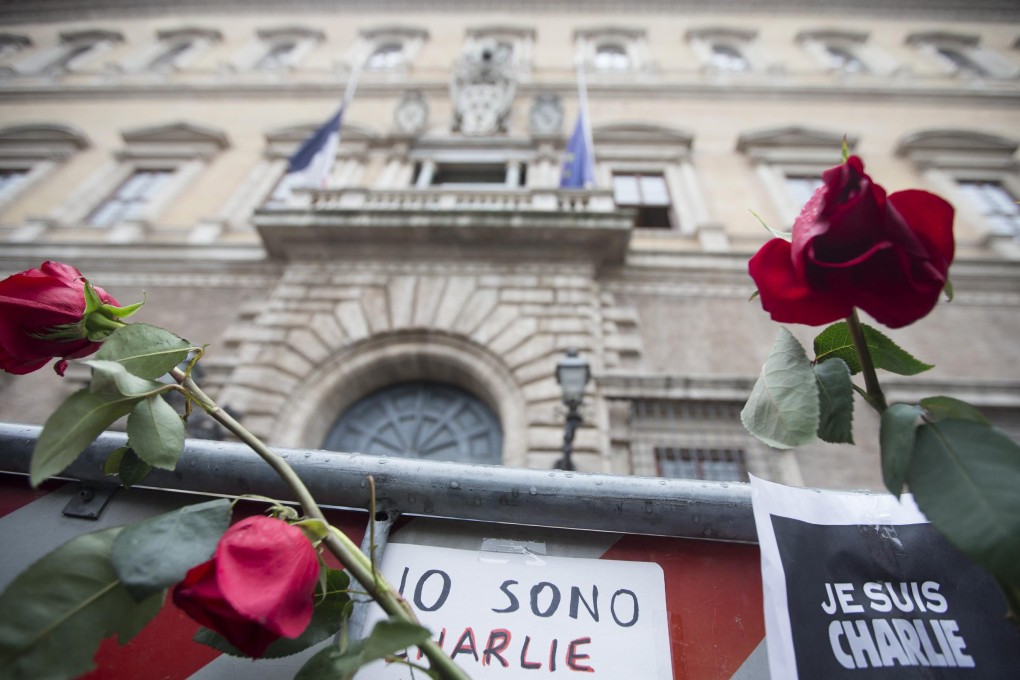As I see it | We are Charlie: reflections on the Charlie Hebdo shooting and the free speech debate

The year 2014 wasn’t a good one for journalists and political satirists. Two American reporters were among a handful of Western hostages beheaded by the militant group Isis in August and September. After that came a series of cyber attacks on Sony Pictures for ridiculing North Korea’s paramount leader Kim Jong-un in the comedy The Interview. Here in Hong Kong, we learned in horror the brutal knife attack on Kevin Lau, former chief editor of the Ming Pao Daily, outside his apartment building on that fateful February morning. It remains unclear whom Lau had ticked off for him to be stabbed six times in the back and legs.
Those who had hoped that 2015 would be a better year for free speech had their bubbles burst only days after they put down the champagne flutes and party hats. On January 7, heavily-armed Islamic extremists stormed the headquarters of Charlie Hebdo in central Paris and murdered the magazine’s lead cartoonists. Firsthand accounts of the midday massacre were chilling: masked gunmen threatened to shoot a staffer’s young daughter if she didn’t give them the building’s entry code, and once they were inside the newspaper office, called out their targets by name. The shooting left twelve people dead, all because a group of people who couldn’t take a joke were upset by some silly cartoons published years ago.
That one of the dozen victims was a Muslim police officer was remarkable on two levels. First, knowingly or not, the officer had died protecting the very people who had mocked his faith. Second, it highlights the hypocrisy of the attackers and their cause, as neither the Quran nor any Islamic teaching sanctions the use of non-defensive violence, much less against one of their own. It bolsters the argument that the terrorist act was no more than a mob hit by a few unhinged radicals, and that it has nothing whatsoever to do with either Islam or the 1.6 billion Muslims around the world. Believing otherwise is as irrational as blaming all Christians for the sexual abuses by a handful of Catholic priests, or demanding an apology from Mainland Chinese tourists for the sale of gutter oil and tainted baby formula in China. We should be smart enough not to lump a few bad apples in with a basket of millions.
The day after 7 January, now a dividing line in modern French history, I phoned up my friend Alexia, a Paris-based lawyer who used to work in Hong Kong. By the time we spoke, she had already attended a half dozen vigils near her office. She said she would light a white candle and place it on her window sill at home, as had many of her fellow Parisians to pay respect to those who had died doing what they did best. Clearly shaken, Alexia told me that Charlie Hebdo, together with Le Canard Enchaîné, were the two most critical voices in France’s printed media (“Think the Apple Daily*,” Alexia said). She also told me that the slain cartoonists, in particular Stéphane Charbonnier, Cabu and Tignous, were prominent provocateurs in France (“Think Jon Stewart and Stephen Colbert,” she said). Their deaths meant more than a tremendous loss of talent, she believed, but a declaration of war on the freedom of speech. And free speech is a right more cherished and jealously guarded in France than probably anywhere else in the world outside the United States.
On the subject of First Amendment rights, the Charlie Hebdo shooting has sparked heated debate on the Internet over the age old question of whether free speech should have limits. The answer is emphatically “yes,” and that’s why it’s against the law in most countries to falsely shout “Fire!” in a movie theatre or joke about seeing a bomb when on board a passenger airplane. Many countries have also banned “fighting words” – hate speech that would cause immediate violence, such as uttering incendiary words to provoke an angry crowd. Other than those limited circumstances, it is very difficult to make a case to encroach on the right to express an opinion, however offensive it is to some. Racist or inflammatory speech may be in bad taste, and the proper response should be outrage, condemnation and boycott, all of which happened to Chip Wilson, founder of Lululemon, after he made an off-colour remark about women. But to assassinate Mr Wilson for upsetting the other gender? You would have to be deranged to sign on to that. Free speech aside, how about a right not to be murdered for speaking one’s mind?
With the help of donations and a trust fund, Charlie Hebdo is expected to print a million copies of their first post-shooting issue next Wednesday, a significant increase over its standard 60,000-copy run. In the days since 7 January, the offending caricatures of the Prophet Muhammad – the very cause of the terrorist attack – have gone viral on social media and are viewed and shared by more people than ever. In the meantime, publications around the world have put out new cartoons supporting the French magazine and mocking the terrorists. Far from having a chilling effect on political satirists, the Paris shooting seems to have inspired more artists and journalists to exercise their freedom of expression. It is precisely what has happened to the Hong Kong government after it tried to snuff out dissent by removing those giant yellow banners hung by activists demanding universal suffrage: yellow signs in every way, shape and form have cropped up all over the city. Attempts to suppress free speech almost always backfire.

